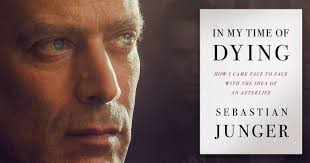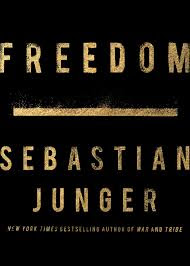Over the past fifteen months I read all six of Sebastian Junger’s books. I didn’t plan it as a project, but once it started it took on the coherence of one. It began in October 2024, when I heard Junger speak at the Hannah Arendt Center conference at Bard College. His talk focused on Tribe, but what stayed with me afterward—especially over lunch—was not any single argument, but his way of seeing the world. He spoke about danger, belonging, and the fragile structures that hold people together in crisis with the clarity of someone who had tested those ideas with his own body.
I had already seen Restrepo in 2010, the year I returned from Iraq. I watched it in a small theater in the Village with Jim Dao, then the New York Times’ war correspondent embedded with the 10th Mountain Division. Dao had encouraged me to see it, and he was right. The film didn’t feel like most war documentaries, which are shot from relative safety or filtered through official narratives. Junger and Tim Hetherington were in the middle of the firefights. The camera shook because bullets were flying. It was impossible not to feel that the filmmakers were risking their lives alongside the soldiers they were recording. Whoever in Army Public Affairs allowed that film to be released was either extraordinarily brave or quietly suicidal. Nothing in it was sanitized.
What struck me most at the time was how exposed Camp Restrepo was compared to my own deployment. I spent much of my Iraq tour on a large airbase. We had missile attacks, and we took badly aimed fire on night flights, but it was nothing like being in an isolated valley surrounded by hostile forces. The men at Restrepo were under threat every hour. When I later read War, Junger’s written account of that deployment, I gained a deeper understanding of the unit and of his own presence there. It only increased my respect for what he and Hetherington had done.
After the Arendt conference, I decided to begin with Tribe. It was the conceptual bridge between Restrepo and everything else Junger had written. I have known the comfort and intensity of belonging, and I also know how fleeting it can be. My best tank crew—the one I trained for months and that shot at the top of our battalion gunnery—fell apart within weeks. One man was reassigned. Another left the Army. Another went to a different unit. As Junger makes clear in both Tribe and Freedom, a tribe can be for life, or it can be for only as long as the mission lasts. Either way, while it exists, it feels more real than almost anything else.
Freedom extended that insight. It argues that human beings are built to endure danger, risk, and uncertainty, and that safety, while pleasant, can be psychologically corrosive. Junger’s stories of people choosing hardship over comfort made me rethink my own career, my own decisions to re-enlist and to seek out difficult environments. Comfort is not always the same as meaning.
Two of Junger’s books unexpectedly returned me to my childhood in the Boston suburbs. A Death in Belmont brought back the fear that hung over our neighborhoods during the era of the Boston Strangler. I was a kid then, but I remember how adults spoke in hushed tones, how doors were locked, how an invisible threat hovered over everyday life. Junger treated that story not just as true crime but as a social mystery, a way of examining how communities process terror.
The Perfect Storm did something similar through nature. Growing up near the Atlantic, I always knew the sea could turn deadly. I had seen nor’easters from shore. Junger turned that abstract danger into a gripping reality, showing how ordinary working men—fishermen just doing their jobs—could be swallowed by forces far beyond their control. Like Belmont, it is a book about how thin the line is between normal life and catastrophe.
Then there was In My Time of Dying. That book forced me to look again at my own near-death experiences. I have had two. One was an explosion that left me blind. The other was a racing crash that broke my neck and nine other bones. I faced mortality, but not in the prolonged, grinding way Junger did. His clarity about what it means to cross that threshold and come back from it is unlike anything I’ve read. It is not mystical. It is analytic, almost clinical, and because of that it is profoundly unsettling.
After finishing all six books, something shifted. I realized that, for all my brushes with danger, I had lived a comparatively sheltered life. Junger had gone farther—to the edge of war, to the edge of the sea, to the edge of his own biological existence—and then returned to tell the story with discipline and precision. He did not glamorize risk. He examined it.
Taken together, Junger’s books describe a world more dangerous than I experienced and more honest than most of what passes for contemporary nonfiction. He writes about soldiers under fire, fishermen in storms, families stalked by a serial killer, and a man dying on a hospital bed, but the subject is always the same: how human beings behave when the structures that protect them fall away. Reading him in sequence revealed a single, sustained inquiry into what it means to live on the edge of disaster—and how, sometimes, that is where life feels most real.


















